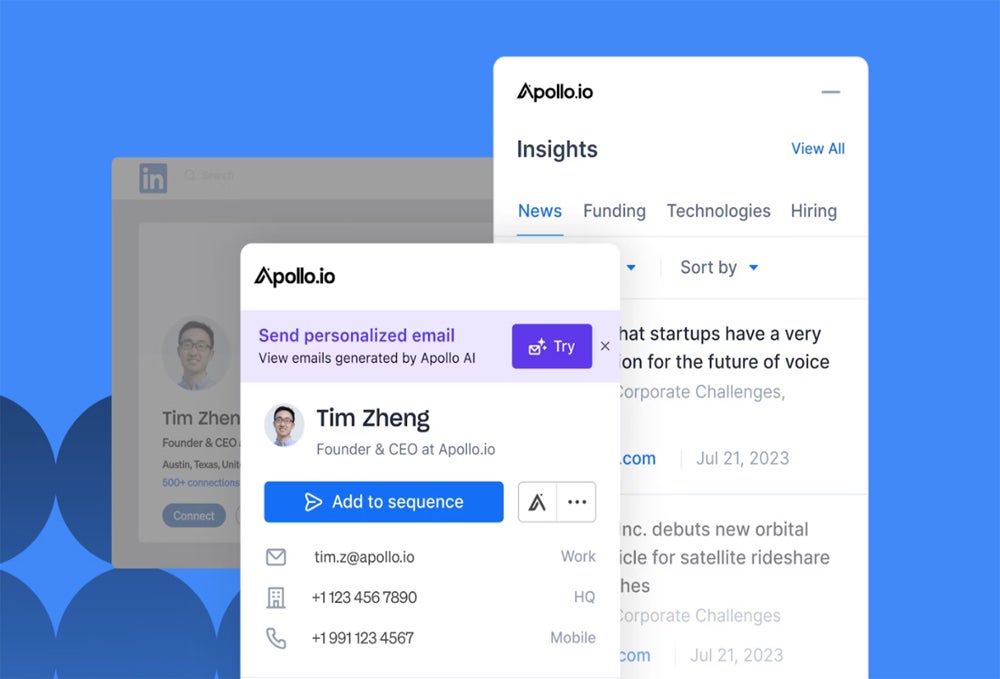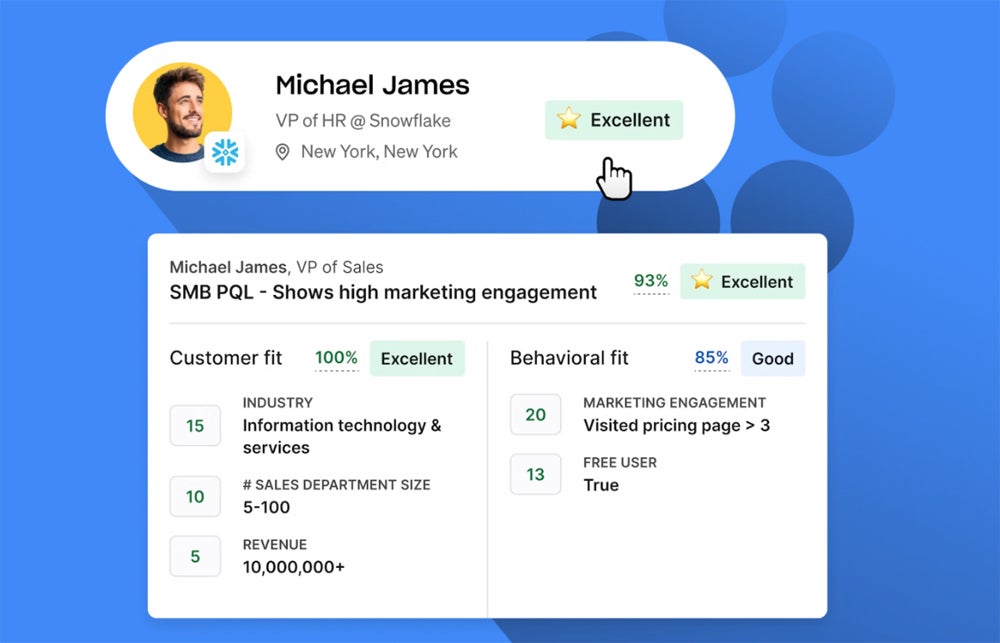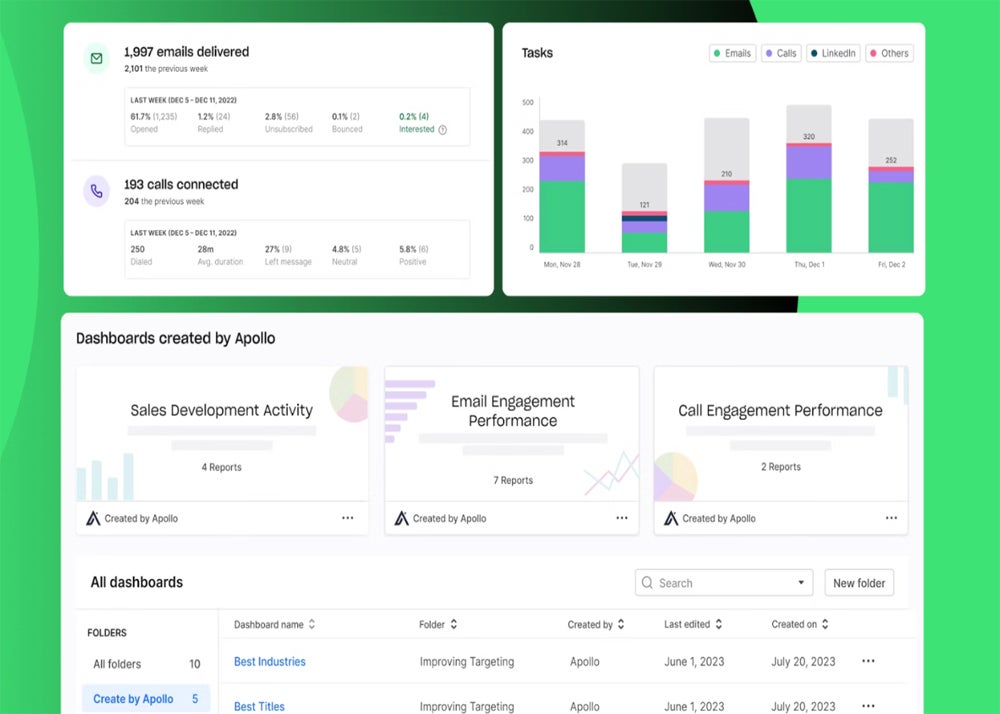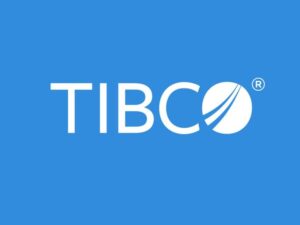Apollo’s fast factsOur product rating: 4.1/5 Pricing: Apollo offers a limited free version of their solution. Key features:
|

Apollo is a leading B2B database provider that also offers an engagement suite and workflow engine solution. As a go-to-market platform, Apollo has a current database of over 275 million contacts and 73 million companies for accurate and bulk prospecting. Users of Apollo can target leads and accounts that fit the business’ ideal customer profile and scale outreach activity with automations.
Apollo’s target audience includes sellers, marketers and owners of startups and large businesses. With the platform’s available integrations, users can sync Apollo with their existing CRM software. This way, users can ensure that contacts and accounts in the CRM are up to date by enriching them with data from Apollo’s dynamic database.
While Apollo offers a good mix of features and pricing, there are other providers that might be better fits for your business, depending on your needs.
Pricing
Apollo’s pricing structure is broken down into four tiers, including a forever free plan. The price is billed per user and comes with a preset amount of mobile and export credits per year, along with additional platform features. Apollo also offers a 14-day free trial.
- Free version: Unlimited email credits, 60 mobile credits per year and 120 export credits per year. Features include basic automations, filters, buying intent, AI-assisted email writing and more.
- Basic: $49 per user per month, billed annually, or $59 per user per month when billed monthly. Users receive unlimited email credits, 75 mobile credits per year and 1,000 export credits per year. Features in their plan include job changes notifications, data enrichment, A/B testing and more.
- Professional: $79 per user per month, billed annually. $99 per user per month when billed monthly. Users receive unlimited email credits, 100 mobile credits per year and 2,000 export credits per year. Features in this package include everything in Basic, plus no sequence limits, advanced reports, email tracking, manual tasks, call recordings and more.
- Organization: $119 per user per month, billed annually, or $149 per user per month when billed monthly. Users receive unlimited email credits, 200 mobile credits per year and 4,000 export credits per year. This tier comes with all features in Professional, plus call transcriptions, customizable reports, advanced security configurations and more.
Key features of Apollo
Contact and account search
Contact and account searching is a critical part of lead prospecting and building B2B databases of valuable leads. Users can then build lists with over 65 filters, including contact title, job function and location or account industry, employee headcount and revenue. This search and list building feature identifies key stakeholders at an account and uses signals like intent data, website visitor tracking and job changes to reach out when the time is right.

Scores and signals
Assigning scores and signals to leads allows users and sales reps to quickly identify and strategize how and when to engage with high-value prospects. Within Apollo, users can define their own criteria and variables to create a unique lead scoring model. From there, combine demographic and behavioral signals to quickly build lists of ideal prospects and add talking tips to ensure the outreach team is prepared for the conversation.

Reporting analytics
Businesses can gain insights into metrics using prebuilt or custom reports and dashboards from a vast array of metrics. For example, users can visualize automation success and messaging effectiveness. There’s the added bonus of being able to run and track A/B testing. This way, organizations can gain a holistic view of overall prospecting performance and engagement data from one dashboard.

Sales engagement
Apollo doesn’t just create lists of high value leads, it also allows users to create outreach and engagement strategies from the platform. Businesses can build custom sequences and automations or use prebuilt templates that include emails, calls, automated LinkedIn tasks and more. Additionally, Apollo’s AI assistant can help the email writing process for recommendations, personalization, rephrasing and more.

Apollo pros and cons
| Users praise intuitive user interface and experience. | Users have requested more onboarding training for the platform. |
| 98% email accuracy. | No mobile app for accessing data and contact information on the go. |
| 275+ million contacts currently. | User reports of inconsistent international data. |
Alternatives to Apollo
Some of the top Apollo alternatives include Zoominfo, UpLead, Lusha and more. These B2B databases offer similar core features to what users would expect from Apollo, with their own individual use cases and pros and cons. Whether you’re looking for a tool for your small business, startup or enterprise, or if certain advanced features are a top priority, there’s a provider that can meet your exact needs.
| Lead scoring | ||||
| Buyer intent data | ||||
| Sales engagement | ||||
| Free trial length | ||||
| Starting price* |
*Price when billed annually

Zoominfo
Zoominfo is a B2B database and lead generation company for sales, marketing and recruitment teams. Zoominfo and Apollo both can score, segment and route incoming leads based on the preset criteria a business sets. Compared to Apollo, Zoominfo doesn’t have transparent pricing but does have a 14-day free trial for their platform and can support multiple industries.
To view our full comparison of Apollo and Zoominfo features, pricing and more, head over to our Apollo vs. Zoominfo article.

UpLead
UpLead is another B2B database that can filter up to 50 unique search criteria for users to source hyper-specific leads. UpLead and Apollo both can offer more information beyond just contact information, such as demographics, firmographics and technographics. Compared to Apollo, UpLead has a much shorter trial period but has a 95% data accuracy guarantee.

Lusha
Lusha is an affordable B2B database that offers advanced tools for companies that prioritize data hygiene. Lusha and Apollo both offer a free version of their platform that consists of a capped amount of revealed lead information a month. Compared to Apollo, Lusha’s four price tiers are lower in cost and Lusha offers robust integrations.
Review methodology
When reviewing Apollo as a top B2B database provider, I considered the core offerings of the most popular solutions, cost transparency and more. I scored Apollo against an in-house rubric made of criteria reflecting what an average buyer might deem important when choosing a B2B database.
Below are the criteria I consider when scoring and then reviewing Apollo:
- Cost: Cost transparency, payment options and price compared to industry standards.
- Core features: Standard capabilities of an average B2B database provider, such as pipeline management or data cleansing.
- Advance tech offerings: Unique or industry-specific functionality that a provider might offer in addition to the core features.
- User reviews: Average user feedback for the provider, either praising or criticizing features, platform UI or support.
Source of Article



